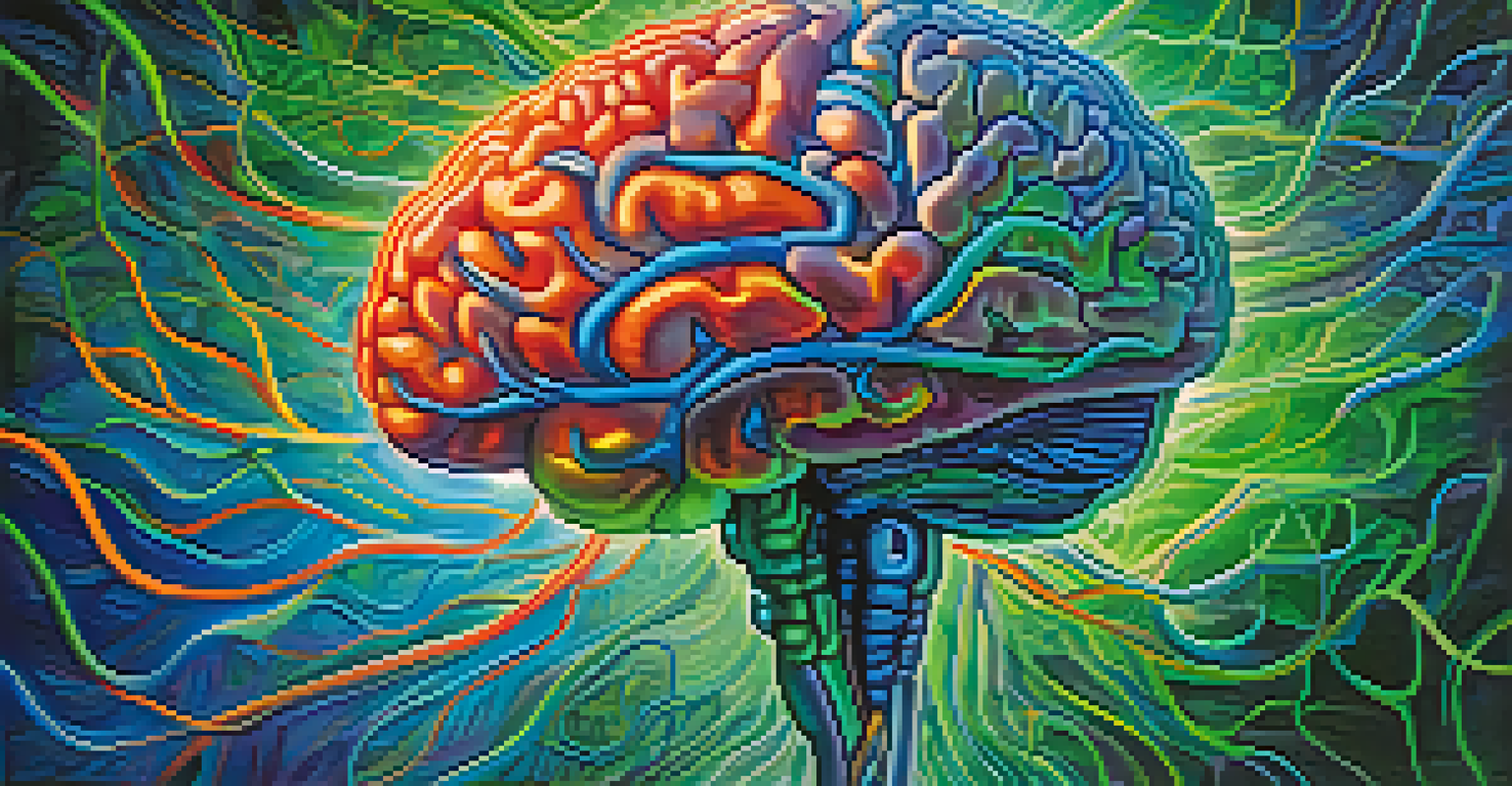Cognitive Effects of Ayahuasca: Insights from Neurobiology

Understanding Ayahuasca and Its Components
Ayahuasca is a traditional Amazonian brew made from the Banisteriopsis caapi vine and other plants, often containing DMT, a potent psychedelic compound. This powerful combination has been used for centuries by indigenous cultures for spiritual and healing purposes. Understanding its cognitive effects requires a closer look at how these ingredients interact with the brain’s chemistry.
The experience of ayahuasca can be a profound journey of self-discovery and emotional healing.
When consumed, ayahuasca induces altered states of consciousness, which can lead to profound psychological insights and emotional breakthroughs. The experience can vary widely among individuals, often described as a journey that promotes introspection and self-discovery. This unique aspect makes ayahuasca particularly interesting for researchers in the field of neurobiology.
As we dive into the cognitive effects of ayahuasca, it's crucial to grasp the underlying mechanisms at play. By exploring how the brain responds to the compounds in ayahuasca, we can better understand its potential benefits and risks in cognitive functioning.
Neurotransmitters: The Brain’s Chemical Messengers
Neurotransmitters are chemicals that transmit signals in the brain, playing a key role in regulating mood, perception, and cognition. When ayahuasca is ingested, it significantly affects neurotransmitter systems, particularly serotonin and dopamine. These changes can lead to enhanced emotional processing and improved mood, which are often reported by users.

Research indicates that DMT, a primary active compound in ayahuasca, binds to serotonin receptors in the brain. This binding can produce feelings of euphoria and altered sensory perceptions, allowing individuals to experience reality differently. By understanding these interactions, we gain insight into how ayahuasca might facilitate cognitive shifts.
Ayahuasca's Cognitive Benefits
Ayahuasca can enhance cognitive functioning by promoting neuroplasticity and emotional processing, leading to deeper self-discovery.
Moreover, the alteration of neurotransmitter activity can lead to neuroplasticity, the brain’s ability to reorganize itself by forming new neural connections. This plasticity is essential for learning and memory, suggesting that ayahuasca might help in overcoming cognitive rigidity and foster creative thinking.
Ayahuasca and the Default Mode Network (DMN)
The Default Mode Network (DMN) is a network of brain regions that is active when we're at rest and not focused on the external environment. This network is associated with self-referential thoughts, memory recall, and daydreaming. Interestingly, ayahuasca appears to dampen DMN activity, leading to a reduction in the typical patterns of self-referential thinking.
Ayahuasca has the potential to facilitate deep emotional processing and cognitive shifts.
By decreasing DMN activity, ayahuasca may help individuals break free from negative thought patterns and self-criticism. Many users report experiencing a sense of connectedness and unity with their surroundings, which can offer a powerful therapeutic effect. This shift in perspective can be especially beneficial for those struggling with anxiety or depression.
Furthermore, the reduced activity in the DMN during an ayahuasca experience allows for enhanced focus on the present moment. This heightened state of awareness can support personal insights and facilitate emotional healing, highlighting the potential cognitive benefits of this ancient brew.
The Role of Neurogenesis in Cognitive Enhancement
Neurogenesis is the process of generating new neurons in the brain, particularly in areas associated with learning and memory, like the hippocampus. Some studies suggest that ayahuasca may promote neurogenesis, thereby enhancing cognitive abilities. This is particularly intriguing as it presents a potential mechanism through which ayahuasca could lead to long-lasting cognitive improvements.
When we consider the effects of stress and trauma on the brain, it's crucial to recognize how neurogenesis can serve as a protective factor. By fostering the growth of new neurons, ayahuasca might help mitigate the cognitive decline often associated with prolonged stress. This could be why many participants report improved mood and cognitive clarity following their experiences.
Impacts on Neurotransmitters
The brew significantly affects neurotransmitter systems, particularly serotonin and dopamine, which can improve mood and emotional clarity.
Moreover, the implications of enhanced neurogenesis extend beyond immediate cognitive effects. Over time, individuals might experience better emotional regulation and resilience, further enriching their cognitive capacities and overall well-being.
Emotional Processing and Ayahuasca Experiences
One of the most profound aspects of ayahuasca is its ability to facilitate deep emotional processing. Users often describe intensely emotional experiences that can bring unresolved feelings to the surface. This cathartic release can lead to significant shifts in perspective and understanding, impacting cognitive functioning positively.
Ayahuasca experiences often allow individuals to confront personal traumas or losses in a safe environment. By navigating these complex emotions, users may find clarity and healing, which can enhance their cognitive abilities. This process of emotional integration is crucial for cognitive health and overall life satisfaction.
Additionally, the emotional insights gained from ayahuasca can foster empathy and compassion towards oneself and others. This expanded emotional intelligence contributes to improved interpersonal relationships and social cognition, underscoring the interconnectedness of emotional and cognitive processing.
Potential Risks and Considerations of Ayahuasca Use
While ayahuasca offers many cognitive benefits, it's essential to acknowledge the potential risks associated with its use. The intense experiences can be overwhelming for some, leading to anxiety or distress during the journey. Therefore, understanding individual mental health conditions is crucial before considering ayahuasca as an option.
Moreover, the setting in which ayahuasca is consumed plays a significant role in the overall experience. A supportive environment with experienced facilitators can enhance the therapeutic aspects, while an unsafe or chaotic setting may exacerbate negative reactions. It's vital to approach ayahuasca use with caution and respect.
Risks of Ayahuasca Use
Despite its potential benefits, ayahuasca use carries risks, particularly for individuals with underlying mental health conditions, highlighting the need for caution.
Lastly, ongoing research is necessary to fully understand the long-term effects of ayahuasca on cognitive functioning. As interest in psychedelic research grows, it's important to consider both the potential benefits and the risks, ensuring that individuals are well-informed before embarking on this journey.
The Future of Ayahuasca Research in Neurobiology
The exploration of ayahuasca and its cognitive effects is still in its early stages, but the future looks promising for neurobiological research. As more studies emerge, we can expect a clearer understanding of how ayahuasca influences brain function and cognition. This knowledge could pave the way for integrating ayahuasca into therapeutic practices for various mental health issues.
Advancements in neuroimaging technology provide researchers with the tools to examine brain activity during ayahuasca experiences. These insights will help clarify the specific cognitive enhancements linked to ayahuasca use, opening up discussions about its applications in modern psychology and psychiatry.

Ultimately, the ongoing investigation into ayahuasca’s effects on cognition may lead to innovative therapeutic approaches that harness its potential. By bridging traditional practices with scientific inquiry, we can explore new avenues for healing and personal growth, offering hope to those seeking cognitive and emotional transformation.